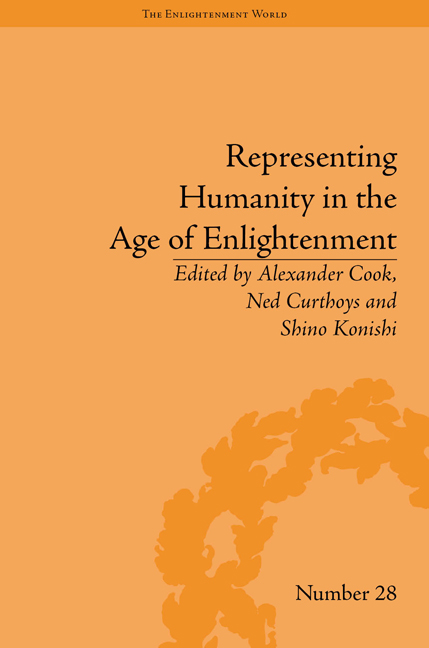Book contents
- Frontmatter
- CONTENTS
- Acknowledgements
- Dedication
- List of Contributors
- List of Figures
- The Science and Politics of Humanity in the Eighteenth Century: An Introduction
- Part I Humanity and the Civilizing Process
- Part II Encountering Humanity
- Part III The Limits of Humanity
- 11 Fictions of Human Community
- 12 Fairy-Tale Humanity in French Libertine Fiction of the Mid-Eighteenth Century
- 13 Philosophical Anthropology and the Sadean ‘System’ or, Sade and the Question of Enlightenment Humanism
- Notes
- Index
11 - Fictions of Human Community
from Part III - The Limits of Humanity
- Frontmatter
- CONTENTS
- Acknowledgements
- Dedication
- List of Contributors
- List of Figures
- The Science and Politics of Humanity in the Eighteenth Century: An Introduction
- Part I Humanity and the Civilizing Process
- Part II Encountering Humanity
- Part III The Limits of Humanity
- 11 Fictions of Human Community
- 12 Fairy-Tale Humanity in French Libertine Fiction of the Mid-Eighteenth Century
- 13 Philosophical Anthropology and the Sadean ‘System’ or, Sade and the Question of Enlightenment Humanism
- Notes
- Index
Summary
The Enlightenment encouraged widespread speculation into the nature of the ‘human’ in order to determine the vital element in the constitution of the modern citizen. This process began in earnest in the seventeenth century as an elaboration of the function of the ‘person’, the semi-fictional creature who acts as the atom of the body of the state in Thomas Hobbes's political philosophy, and as the representative of identity in that of John Locke. Influential voices early in the eighteenth century tried to define the social personality as the fruit of impulses much more amiable and less instrumental than Hobbes claimed them to be. Architects of ‘moral sense’ philosophy, in particular, were responsible to a large extent for the cults of sensibility and sympathy that were understood to demonstrate the spontaneous springs of social union. For these thinkers, to be human was to be inherently inclined towards the well-being of the species, a propensity overriding national boundaries and cultural differences. Towards the end of the century the human was defined more coolly as the sphere of rights that are self-evidently the property of the species, so that ‘human’ by now was a category distinct from personal identity, ethos, character, wealth, feeling, sympathy or desert.
- Type
- Chapter
- Information
- Representing Humanity in the Age of Enlightenment , pp. 149 - 160Publisher: Pickering & ChattoFirst published in: 2014

